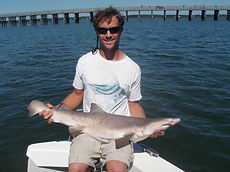Current members
Scott Lynch
M.Sc. Marine Biology, Univ. Mass. Dartmouth (2015-). My current research covers physiological and environmental effects on white shark movement. I will be doing this through the analysis of a library of white shark movement data collected using gps-based SPOT tags. My past research includes a study investigating the effects of tagging on the physiology of juvenile sandbar sharks.
Past members
Tobey Curtis

Ph.D Marine Science , Univ. Mass. Dartmouth (2009-2018). I received my B.Sc.from Long Island University - Southampton in 2000, and my M.Sc. from the University of Florida in 2008. My research interests are in the ecologyand fisheries biology of sharks, skates, and rays. My past research hasmostly focused on using tagging and telemetry to investigate the movementsand habitat use of a variety of species. My PhD research is focusing onthe seasonal movements and habitat preferences of basking sharks in thenorthwest Atlantic using satellite tags and sightings data. By gaining agreater understanding of the ecology of these vulnerable shark species, Ihope my research may be used to promote more sound conservation andmanagement policies. I am also currently a Fishery Policy Analyst for NOAA's National Marine Fisheries Service in Gloucester, Massachusetts.
Sofia Gabriel
Dr. Corey Eddy

Ph.D Marine Science, Univ. Mass. Dartmouth (2009-2017). I received my B.S. in Marine Biology from the University of Rhode Island. For my thesis, I am studying the ecological impact of the invasive lionfish upon Bermuda’s coral reef ecosystem. Supported by a Darwin Plus grant from the United Kingdom’s Department for Environment, Food and Rural Affairs, I am assessing the overall population of these invasive fish to describe their abundance and distribution, as well as population size and demographic characteristics. My work will also investigate their growth rates and reproductive characteristics such as seasonality and fecundity. The keystone chapter of my thesis focuses upon the feeding ecology of lionfish using stable isotope and stomach content analyses.I previously studied the physiological stress response, survival, and post-release behavior of silky sharks captured in tuna purse seines. Before that, I was studying the diversity and population structure of sharks in Bermuda, with a specific focus on the life history, feeding ecology, and movements of Galapagos sharks. I am also a Fellow through the National Science Foundation’s Graduate Research Program and a member of the Bermuda Lionfish Task Force. As a volunteer for the Ocean Support Foundation, I developed and currently manage the Bermuda Lionfish Culling Program on behalf of the Department of Environmental Protection.

Ph.D Marine Science, Univ. Mass. Dartmouth (2008-2013). My research interests are in the fields of fisheries ecology and fisheries biology with particular emphasis on the physical and physiological stressors experienced by elasmobranch and large pelagic fishes during capture on commercial and recreational fishing gear and their effects on post-release fate. My current projects span a wide taxonomic range of fish including, thorny skate, black sea bass, sand tiger sharks, common thresher sharks, yellowfin tuna and bluefin tuna. Through my research I hope to generate data that can be integrated into stock assessments, used to develop and enhance fishing regulations, and generally promote sustainable fishing practices. I am currently an associate scientist at the New England Aquarium's Anderson Cabot Center for Ocean Life working cooperatively with projects at the University of Maine, Rutgers University, and the Pfleger Institute of Environmental Research.
Ph.D BMEBT, Univ. Mass. Dartmouth (2009-2015). My research interests are primarily focused around shark physiological ecology, with an emphasis on capture-related stress physiology and post-release mortality. My research has included studying heart biochemical adaptations in lamnid sharks, the movement ecology of porbeagle sharks, and the stress physiology, post-release mortality, and ecology of sandbar and dusky sharks. Following my graduation from UMass Dartmouth, I began a Postdoctoral Research Fellowship at Mote Marine Laboratory in Florida, following up on the stress physiology work I began in my PhD, specifically investigating physiological predictors of mortality, and assessing post-release mortality rates of many coastal shark species caught on bottom longline gear. I have also worked with the research non-profit OCEARCH as a member of the science team for five shark-tagging expeditions, including trips to the Galapagos and Chile. Specifically, my role on these expeditions was blood sampling, processing, and quantifying the stress physiology of the sharks as they go through the capture and tagging process. In addition, I am a co-founder of The Gills Club, a group that works to connect girls with female marine biologists in the field, share knowledge, and empower them to take leadership positions and inspire others with their own passion for sharks.
Dr. Heather Marshall

James Patterson
M.Sc. Marine Biology, Univ. Mass. Dartmouth (2007-2009).
Maggie Winchester

M.Sc. Marine Biology, Univ. Mass. Dartmouth (2017 - 2019). My research interests are in capture stress and post-release mortality, and my current research addresses these topics through the study of cardiac function. I am looking specifically into how the physiological response to stress impacts the function of the heart, and aim to identify the point at which the heart is no longer able to recover. I am comparing benthic, coastal, and pelagic species of elasmobranch in order to address how metabolic activity level and temperature may impact these parameters.
Ashey Stoehr

Ph.D BMEBT, Univ. Mass. Dartmouth (projected 2018)
M.Sc. BMEBT, Univ. Mass. Dartmouth (2012)
B.S. Marine Biology, B.A. Political Science, Univ. Rhode Island (2010)
As a comparative morphologist and eco-physiologist, Dr. Stoehr is interested
in how the anatomy and physiology of organisms influence their ability to
exploit or persist in changing environments. More specifically, her research
investigates the impact of temperature on the physiology, behavior, and
distribution of marine organisms – be they large, pelagic fishes or interstitial,
intertidal organisms. She aims to understand what specializations, if any,
allow some large, pelagic fishes, like bigeye thresher sharks and swordfish,
to hunt in cold, hypoxic environments; and how anthropogenic impacts like
climate change alter intertidal communities in Long Island Sound.
Dr. Stoehr uses field, biochemical and biomechanical techniques to address
hypotheses at the cellular through the organismal levels of study. This
approach helps to elucidate how, for example, physiological mechanisms
control species’ distributions and behaviors (e.g., surface-orientated vs. deep-
diving fishes). Understanding how organisms survive in diverse ecosystems is
vital to accurately predicting species distribution patterns in our changing
world.

